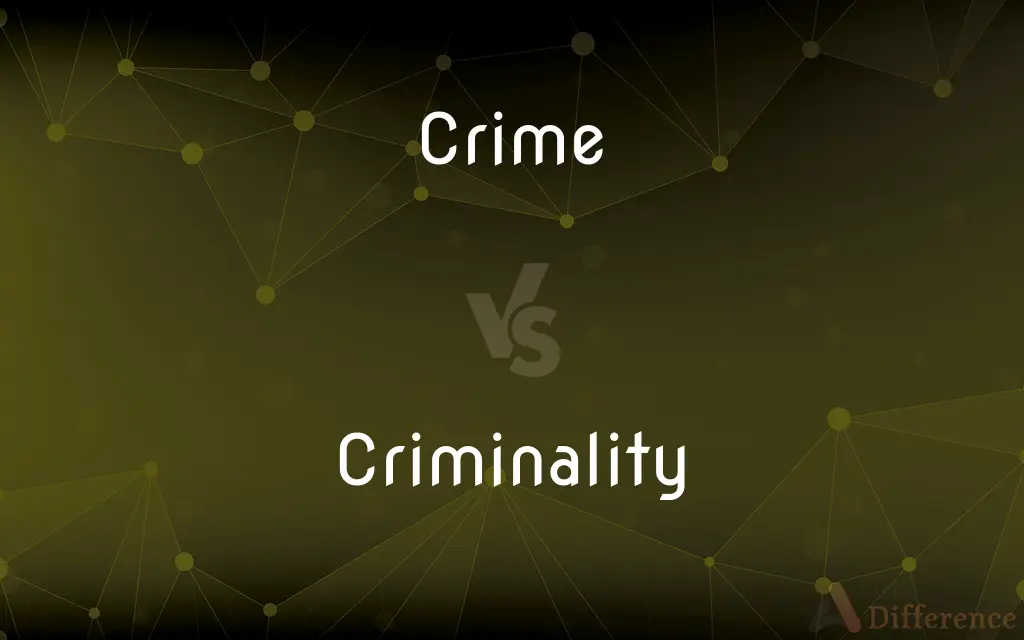Crime vs. Criminality — What's the Difference?
By Tayyaba Rehman & Maham Liaqat — Updated on March 13, 2024
Crime refers to actions that violate legal codes and are punishable by law, whereas criminality is the predisposition or tendency of individuals or groups to commit crimes.

Difference Between Crime and Criminality
Table of Contents
ADVERTISEMENT
Key Differences
Crime is defined as an act or omission that violates a law which results in a punishment. These laws are established by a governing authority and can include offenses ranging from theft to murder. On the other hand, criminality involves the study of factors that lead individuals or groups to engage in criminal behaviors, focusing on psychological, social, and economic influences.
While crime is a specific act that can be observed, reported, and punished, criminality is a more abstract concept. It deals with the propensity or inclination towards criminal behavior, rather than the behavior itself. Whereas crime is tangible and quantifiable through statistics and reports, criminality is studied through research in fields like criminology and psychology to understand its underlying causes.
The approach to addressing crime often involves law enforcement, legal proceedings, and correctional measures to punish and rehabilitate offenders. Conversely, addressing criminality requires preventative measures, such as education, community programs, and social services, aimed at reducing the factors that lead to criminal behavior.
Crime can occur without a history of criminality, as individuals may commit crimes due to situational factors, such as necessity or coercion, without a predisposition towards such behavior. In contrast, criminality implies a deeper, often ingrained, propensity for engaging in criminal acts, which may not always lead to actual criminal behavior if mitigated by positive environmental influences.
The legal system focuses on crime through the lens of law and order, holding individuals accountable for their actions and ensuring justice for victims. Meanwhile, the study of criminality seeks to understand and address the root causes of criminal behavior, aiming for long-term solutions to prevent crime by targeting its origins.
ADVERTISEMENT
Comparison Chart
Definition
An act that violates legal codes and is subject to punishment.
The predisposition or tendency to commit crimes.
Focus
Specific acts or omissions that are against the law.
The underlying factors and tendencies that lead to criminal behavior.
Approach
Punitive and corrective measures through the legal system.
Preventative measures focusing on reducing risk factors.
Tangibility
Observable and quantifiable actions.
Abstract concept studied through criminology and psychology.
Legal System Role
Enforces laws, prosecutes offenders, and ensures justice.
Informs preventative and rehabilitative strategies to reduce crime rates.
Compare with Definitions
Crime
A violation of societal laws punishable by the legal system.
Shoplifting is considered a crime and can lead to arrest.
Criminality
The inclination or propensity towards criminal behavior.
Studies on criminality focus on understanding why individuals commit crimes.
Crime
Can be classified into various categories, such as felonies or misdemeanors.
Felonies are serious crimes that carry heavier penalties.
Criminality
The subject of research in criminology and sociology.
Criminality is studied to develop strategies for crime prevention.
Crime
Recorded and analyzed through crime statistics.
Crime rates are used to assess the safety of communities.
Criminality
Not necessarily resulting in criminal acts if mitigated.
Effective social programs can reduce criminality among at-risk youth.
Crime
Actions against the law, including theft, assault, and murder.
The police investigate crimes to bring offenders to justice.
Criminality
Focuses on prevention and addressing root causes.
Addressing the causes of criminality can lead to a decrease in crime rates.
Crime
Subject to legal proceedings and penalties.
Committing a crime can result in fines, imprisonment, or both.
Criminality
Influenced by a variety of factors, including environment and genetics.
Poor social conditions are linked to higher levels of criminality.
Crime
In ordinary language, a crime is an unlawful act punishable by a state or other authority. The term crime does not, in modern criminal law, have any simple and universally accepted definition, though statutory definitions have been provided for certain purposes.
Criminality
The state, quality, or fact of being criminal.
Crime
An act committed in violation of law where the consequence of conviction by a court is punishment, especially where the punishment is a serious one such as imprisonment.
Criminality
A criminal practice or act.
Crime
Unlawful activity
Statistics relating to violent crime.
Criminality
(uncountable) The state of being criminal.
Crime
A serious offense, especially one in violation of morality.
Criminality
(uncountable) Criminal activity.
Rampant criminality
Crime
An unjust, senseless, or disgraceful act or condition
It's a crime to waste all that paper.
Criminality
(countable) A criminal act.
Crime
(countable) A specific act committed in violation of the law.
Criminality
The quality or state of being criminal; that which constitutes a crime; guiltiness; guilt.
This is by no means the only criterion of criminality.
Crime
(countable) Any great sin or wickedness; iniquity.
Criminality
The state of being a criminal
Crime
That which occasions crime.
Crime
(uncountable) Criminal acts collectively.
Crime
(uncountable) The habit or practice of committing crimes.
Crime doesn’t pay.
Crime
To subject to disciplinary punishment.
Crime
(nonce word) To commit crime.
Crime
Any violation of law, either divine or human; an omission of a duty commanded, or the commission of an act forbidden by law.
Crime
Gross violation of human law, in distinction from a misdemeanor or trespass, or other slight offense. Hence, also, any aggravated offense against morality or the public welfare; any outrage or great wrong.
Crime
Any great wickedness or sin; iniquity.
No crime was thine, if 'tis no crime to love.
Crime
That which occasion crime.
The tree of life, the crime of our first father's fall.
Crime
(criminal law) an act punishable by law; usually considered an evil act;
A long record of crimes
Crime
An evil act not necessarily punishable by law;
Crimes of the heart
Common Curiosities
Can someone with criminality never commit a crime?
Yes, it's possible for someone with a predisposition towards criminal behavior to never commit a crime, especially if mitigating factors are present.
Can crime occur without criminality?
Yes, individuals can commit crimes due to situational factors without having a predisposition towards criminal behavior.
Is criminality the same as being a criminal?
No, criminality refers to the propensity to commit crimes, while being a criminal indicates someone has committed a crime.
What role does society play in addressing criminality?
Society plays a crucial role through social policies, educational opportunities, and support systems to mitigate factors leading to criminality.
What factors contribute to criminality?
Factors include psychological traits, environmental influences, socioeconomic status, and genetic predispositions.
How do psychologists study criminality?
Psychologists study criminality through behavioral research, psychological assessments, and examining the influence of mental health.
What is the difference between crime and criminality?
Crime refers to specific acts that break the law, while criminality is the tendency or predisposition to commit crimes.
How is crime measured?
Crime is measured through reports, statistics, and records of legal proceedings.
How do legal systems address criminality?
Legal systems primarily focus on crime, but they also support initiatives aimed at preventing criminality, such as rehabilitation programs.
Do socioeconomic factors affect criminality?
Yes, socioeconomic factors like poverty, lack of education, and unemployment can increase the risk of criminality.
Can criminality be cured?
While "cured" may not be the appropriate term, interventions can significantly reduce the propensity for criminal behavior.
What is the impact of criminality on communities?
High levels of criminality can lead to increased crime rates, affecting community safety, cohesion, and overall quality of life.
How can criminality be reduced?
Through education, social services, community programs, and addressing socioeconomic disparities.
Are all crimes a result of criminality?
Not all crimes are due to criminality; some are the result of specific circumstances or immediate decisions.
Is criminality inherited?
While some research suggests genetic factors may influence criminality, environment and upbringing play significant roles.
Share Your Discovery

Previous Comparison
Doctor vs. Lawyer
Next Comparison
Fantastic vs. FantasyAuthor Spotlight
Written by
Tayyaba RehmanTayyaba Rehman is a distinguished writer, currently serving as a primary contributor to askdifference.com. As a researcher in semantics and etymology, Tayyaba's passion for the complexity of languages and their distinctions has found a perfect home on the platform. Tayyaba delves into the intricacies of language, distinguishing between commonly confused words and phrases, thereby providing clarity for readers worldwide.
Co-written by
Maham Liaqat













































